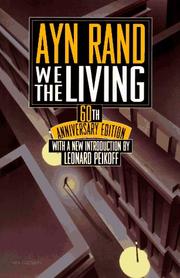Check nearby libraries
Buy this book

The time is the Russian Revolution. The place is a country burdened with fear - the midnight knock at the door, the bread hidden against famine, the haunted eyes of the fleeing, the grublike fat of the appeasers and oppressors. In a bitter struggle of the individual against the collective, three people stand forth with the mark of the unconquered in their bearing: Kira, who wants to be a builder, and the two men who love her - Leo, an aristocrat, and Andrei, a Communist. In their tensely dramatic story, Ayn Rand shows what the theories of Communism mean in practice. We the Living is not a story of politics but of the men and women who have to struggle for existence behind the Red banners and slogans. It is a picture of what dictatorship - of any kind - does to human beings, what kind of men are able to survive, and which of them remain as the ultimate winners. What happens to the defiant ones? What happens to those who succumb? Who are the winners in this conflict? Against a vivid panorama of political revolution and personal revolt, Ayn Rand offers an answer that challenges the modern conscience.
The time is the Russian Revolution. The place is a country burdened with fear - the midnight knock at the door, the bread hidden against famine, the haunted eyes of the fleeing, the grublike fat of the appeasers and oppressors. In a bitter struggle of the individual against the collective, three people stand forth with the mark of the unconquered in their bearing: Kira, who wants to be a builder, and the two men who love her - Leo, an aristocrat, and Andrei, a Communist.
In their tensely dramatic story, Ayn Rand shows what the theories of Communism mean in practice. We the Living is not a story of politics but of the men and women who have to struggle for existence behind the Red banners and slogans. It is a picture of what dictatorship - of any kind - does to human beings, what kind of men are able to survive, and which of them remain as the ultimate winners.
What happens to the defiant ones? What happens to those who succumb? Who are the winners in this conflict? Against a vivid panorama of political revolution and personal revolt, Ayn Rand offers an answer that challenges the modern conscience.
Check nearby libraries
Buy this book

Previews available in: English
Subjects
Fiction, History, Fiction, historical, general, Soviet union, history, revolution, 1917-1921, fiction, Man-woman relationships, Revolution (Soviet Union : 1917-1921) fast (OCoLC)fst01907572, Revolution, 1917-1921, Soviet Union, Fiction, political, Fiction, general, Didactic fictionPlaces
Soviet UnionTimes
Revolution, 1917-1921Showing 6 featured editions. View all 27 editions?
| Edition | Availability |
|---|---|
| 1 |
eeee
|
| 2 |
eeee
|
| 3 |
eeee
|
| 4 |
aaaa
|
| 5 |
eeee
|
| 6 |
eeee
|
Book Details
Edition Notes
Classifications
The Physical Object
ID Numbers
Source records
Scriblio MARC recordIthaca College Library MARC record
Library of Congress MARC record
Better World Books record
Internet Archive item record
Promise Item
marc_columbia MARC record
Work Description
This book is about a young woman named Kira Argounova who is trying to live during the Soviet takeover of Russia. Kira wants to be an engineer, but the lack of freedom in Soviet Russia oppresses her. She becomes involved in a love triangle with Comrade Taganov and the mysterious Leo. The book is a philosophical exposition of the crushing nature of the collectivist philosophy, which oppresses the producers.
“Can you sacrifice a few? When those few are the best? Deny the best its right to the top--and you have no best left. What are your masses but millions of dull, shriveled, stagnant souls that have no thoughts of their own, no dreams of their own, no will of their own, who eat and sleep and chew helplessly the words others put into their brains? And for those you would sacrifice the few who know life, who are life? I loathe your ideals because I know no worse injustice than the giving of the undeserved. Because men are not equal in ability and one can't trust them as if they were.”
Community Reviews (0)
Feedback?| January 26, 2022 | Edited by tmanarl | Merge works |
| October 5, 2021 | Edited by ImportBot | import existing book |
| February 13, 2020 | Edited by MARC Bot | remove fake subjects |
| September 5, 2019 | Edited by JeffKaplan | Reverted Spam |
| December 9, 2009 | Created by WorkBot | add works page |

















